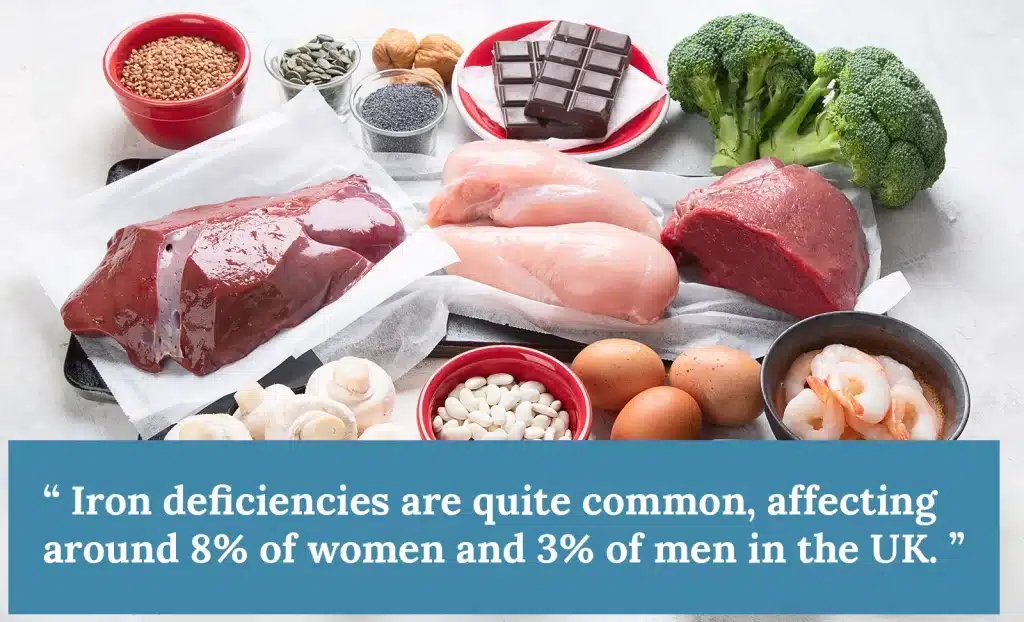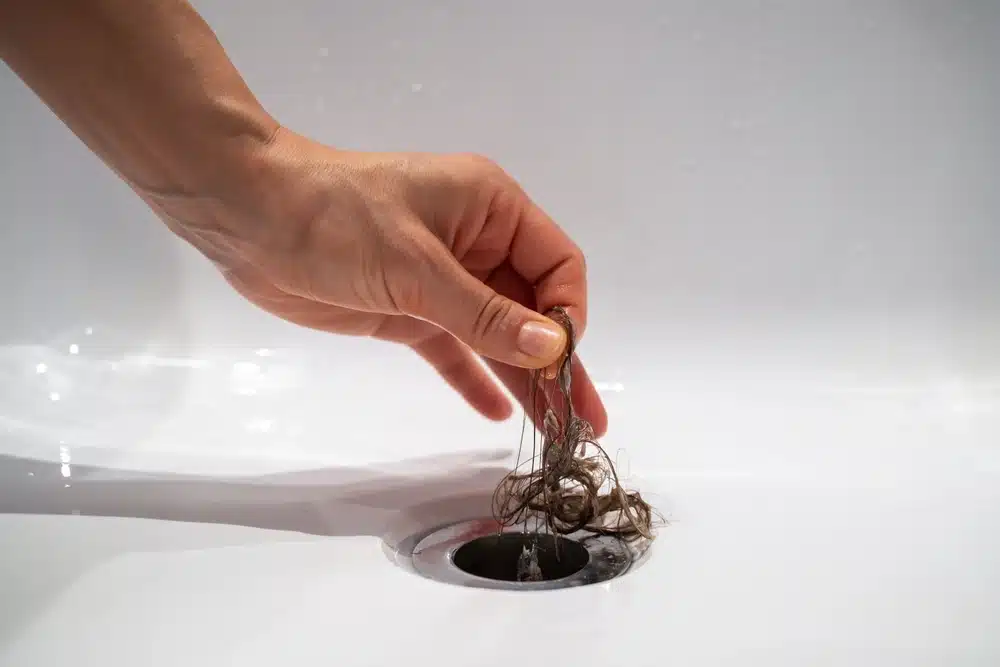What you eat has a big effect on your appearance. If you don’t eat a healthy diet full of all the necessary nutrients, you will likely experience dry, dull skin and hair – not to mention your energy levels won’t be nearly as high as they should be. So, what about hair loss? Can your diet really impact how much hair grows?
The answer is yes. Your body needs a variety of nutrients to support vital functions, and in some cases, a nutritional deficiency can cause your hair to fall out. If you want to know more about which vitamin deficiency causes hair loss, you are in the right place.
About Hair Loss
Hair loss is pretty common, with around 85% of men experiencing hair loss by the time they are fifty [1]. It’s important to note that some hair loss is completely normal, as the scalp naturally loses between 50 to 100 hairs per day. [2] It’s when the number exceeds this and the hair doesn’t come back that problems occur. With men, hair loss typically targets the crown of the head and the hairline, whereas women tend to experience hair loss all over, with one common sign being a wider parting.
There are many potential causes of hair loss, with a common one being a vitamin deficiency. For vitamin deficiencies, the standard hair loss treatment is getting more of that vitamin in the diet.
Vitamin Deficiencies that Cause Hair Loss
So, which vitamin deficiency causes hair loss? If you have experienced hair loss and are wondering whether it’s due to your diet, consider that you may be deficient in one of the following.
Vitamin D
Vitamin D deficiencies are common, giving symptoms such as muscle pain, pins and needles, pain sensitivity, bone pain, and – yes – hair loss. Not getting enough vitamin D can lead to brittle hair that breaks off, as well as hair loss overall. A vitamin D deficiency usually occurs when someone does not get enough sunlight or does not consume enough foods containing vitamin D, such as red meats, egg yolks, and oily fish. To get more vitamin D, you can increase your sun exposure and eat more vitamin D-rich foods. There are also plenty of vitamin D supplements you can purchase over the counter, although it’s best to speak to your doctor before taking any new medication.
Vitamin E
Another vitamin necessary for healthy hair growth is vitamin E – without enough vitamin E in your diet, you may experience dry, brittle hair that leads to split ends and breakage. Other symptoms of a vitamin E deficiency include muscle weakness, vision problems, and coordination issues. The good news is that it’s pretty easy to correct a vitamin E deficiency, as you can simply take vitamin E supplements or start eating more foods that are rich in vitamin E, such as nuts, seeds, vegetable oils, mangoes, leafy vegetables, and eggs.
Vitamin C
Vitamin C is an essential nutrient commonly found in citrus fruits, berries, and vegetables. A vitamin C deficiency is common, affecting up to 25% of men [2], and can cause a range of symptoms, including hair loss, fatigue, irritability, dry skin, bruising, and bleeding gums. In some cases, it leads to scurvy, a condition typically associated with sea voyages due to the passengers not having access to vitamin C-rich foods.
With vitamin C playing such a crucial role in your body’s functions, it’s important to get enough of it in your diet. Those with a vitamin C deficiency can either increase their intake of vitamin C-rich foods or take a vitamin C supplement.
Vitamin B
Another vitamin deficiency that can cause hair loss is vitamin B, also known as riboflavin. Vitamin B is essential as it boosts energy absorption, cell metabolism, and red blood cell production. Without it, unpleasant symptoms can occur, such as mouth ulcers, headaches, appetite loss, irritability, pins and needles, vision problems, and a yellow tone to the skin. It can also cause the hair to shed, as deficiency causes problems with the cell’s ability to divide.
In most cases, you can treat a vitamin B deficiency with supplements – vitamin B12 tablets are particularly common. In more serious cases, vitamin B12 injections may be required. Dietary changes can also help, with foods such as beef, pork, eggs, fish, and milk all helping boost vitamin B levels within the body.
Zinc
While zinc is not a vitamin, it’s still worth mentioning when answering which vitamin deficiency causes hair loss. This mineral is responsible for normal body functions, including wound healing and boosting the immune system. A zinc deficiency can lead to symptoms such as growth problems (especially in children), cognitive issues, a diminished sense of taste and/or smell, digestive problems, skin problems, and hair loss. Fortunately, it’s pretty straightforward to treat a zinc deficiency – you can either increase your zinc intake by eating foods such as poultry, red meat, grains, and nuts, or you can take a daily zinc supplement.
Biotin
Biotin supplements are popular and are often advertised as a way to achieve healthier skin, hair, and nails. There definitely is some truth there! A biotin deficiency leads to cracked skin, dry eyes, appetite loss, dry skin, and hair loss. To treat a biotin deficiency, you can either take a supplement (many are available over the counter) or include more biotin-rich foods in your diet, which include sweet potatoes, nuts, eggs, avocadoes, mushrooms, and legumes.
Iron
Iron deficiencies are quite common, affecting around 8% of women and 3% of men in the UK. [4] There are many causes of iron deficiencies, including blood loss (especially during periods), pregnancy, certain health conditions like celiac disease, and simply not getting enough iron in the diet. In some cases, an iron deficiency can lead to anaemia, which showcases symptoms such as fatigue, weakness, shortness of breath, an irregular heartbeat, cold hands and feet, and dizziness.
To treat an iron deficiency, you can get an iron supplement from your doctor – in more severe cases, IV iron may be necessary. You can also adjust your diet to contain more iron-rich foods.
What to Do if You Are Experiencing Hair Loss
If you are experiencing hair loss, visit your doctor as soon as possible. Your doctor will perform a blood test, which can determine if you are deficient in any of the vitamins listed above – if so, your next plan of action is to treat that deficiency.
Should You Take a Vitamin Supplement to Treat Hair Loss?
It is best to only take a vitamin supplement to treat hair loss if you know you have a deficiency. Otherwise, it could be a waste of your money. Again, going to the doctor is the best move, as that way, you can be 100% sure of any potential vitamin deficiencies.
Do Vitamin Supplements Work?
Yes – vitamin, zinc, and iron supplements work well to get your levels back to normal. However, they won’t help if you don’t actually have a deficiency. Also, you must follow the instructions carefully to ensure absorption; for example, if the instructions say to take your vitamin supplement with food, you must do so for the vitamin to be absorbed into the body. If you want to monitor whether your vitamin supplement actually helps regrow your hair, you can always use a hair track app.
Other Possible Causes of Hair Loss
There are many other potential causes of hair loss – vitamin deficiency is only one of them! If you don’t have hair loss vitamin deficiency but still notice your hair falling out or thinning, here’s what might be causing it:
- Male or Female Pattern Baldness
- Alopecia Areata
- Hormonal Changes
- High Levels of Stress
- Certain Medication Conditions
- Tight Hairstyles
- Certain Medications
- Treating Hair Loss
If you don’t have vitamin deficiency hair loss, you may wonder what other treatment options are available, as your treatment won’t be as simple as taking a vitamin supplement.
Hair Loss Medications: Hair loss medications such as minoxidil and finasteride can work wonders for healthy hair growth.
Platelet-Rich Plasma: Platelet-rich plasma involves a healthcare professional administering plasma into the scalp to stimulate hair growth.
Microneedling: This involves tiny needles making small wounds in the scalp, which increases cell turnover and blood stimulation to increase hair growth.
Hair Transplant: A hair transplant works excellently for androgenetic alopecia. It involves transplanting healthy hair follicles to the balding area, which then regrows healthy hair permanently.
Which Vitamin Deficiency Causes Hair Loss: In Summary
As you can see, the answer to the question, “Which vitamin deficiency causes hair loss?” is many – vitamins C, D, E, and B can all lead to hair fallout. If you have any concerns over your vitamin levels and/or hair loss, see your doctor as soon as possible, as the faster you understand the cause of your hair loss, the quicker you can receive treatment.
Are you looking for a permanent, natural-looking hair restoration option? At Harley Street Hair Clinic, we offer tailored hair transplant treatments that will give you a full head of hair for life. Check out our patients gallery to see what we can do for you.
Sources:
- https://www.healthline.com/health/why-do-men-go-bald#:~:text=By%20the%20age%20of%2035,will%20have%20significantly%20thinner%20hair
- https://www.nhs.uk/conditions/hair-loss/
- https://pubmed.ncbi.nlm.nih.gov/18812436/
- https://cks.nice.org.uk/topics/anaemia-iron-deficiency/background-information/prevalence/#:~:text=In%20the%20UK%2C%20it%20is,women%20have%20iron%20deficiency%20anaemia





